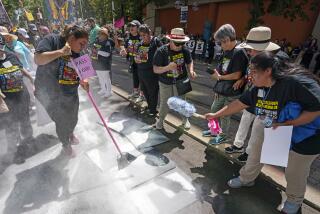ECONOMY : Congress Again Asked to Put Price on Cooking, Diapering : Advocates say gross domestic product should cover household tasks. Critics doubt accuracy.
- Share via
WASHINGTON — The nation’s official measurement of economic output does not measure cooking dinner, vacuuming the house, diapering the baby or other unpaid domestic tasks performed in many households.
But should it?
That’s a question Congress will have to answer as it considers legislation that would require the Commerce Department to include all unpaid work performed in the United States in its calculations of the nation’s gross domestic product. The GDP measures goods and services produced by labor and property in the United States and is used to track the condition of the economy.
Women’s rights advocates and others have been arguing for decades that household work would have more dignity and national economic figures would be more accurate if unpaid work were included in the GDP.
“We want the caring work that women do officially counted as an actual contribution to the economy of the United States,” said Margaret Prescod, director of the U.S. chapter of the International Wages for Housework Campaign.
PROPOSAL: Last year, Rep. Barbara-Rose Collins (D-Mich.), introduced the Unremunerated Work Act as an end-of-session trial balloon. The legislation was enthusiastically received, Collins said. Reintroduced in the current session, it now has 61 co-sponsors and, as yet, no vocal congressional opposition.
For Collins, a single mother, the issue had personal resonance. “I worked two, three jobs for years, then came home and worked the fourth job,” she said. “But the work I did at home--which was valuable to my children, valuable to my nation--had no value whatsoever” in society’s eyes.
The bill requires the commissioner of the Bureau of Labor Statistics to conduct nationwide, time-use surveys of all unpaid work performed in the United States. The surveys would include, according to the bill, “household work, work related to child care and other care services, agricultural work, work related to food production, work related to family businesses, and volunteer work.”
Different methods for calculating monetary value are under consideration. One, for example, would assign a dollar value to domestic duties based on the cost of having it done by outside help.
BACKGROUND: Prescod and other activists launched their battle for housework recognition in 1972, buttonholing lawmakers around the world. In 1985, the United Nations reacted by adopting a resolution calling for member countries to include women’s work in their national economic measurements.
To date, no country includes such work in its official national account. France, however, publishes a “satellite GDP” that includes unpaid work, and Germany, Norway, New Zealand, Australia and Canada are collecting data on unpaid contributions.
ARGUMENTS FOR: Not only will the measure increase the dignity of household work, supporters say, but it will make national economic accounting more honest.
Excluding unpaid labor from the GDP overstates spurts in economic growth and also the downturn of recessions, said University of Nebraska economists Hendrik Van Den Berg and Scott Fuess.
For example, Van Den Berg said, assume a mother was laid off from her job and, in turn, discharged her paid day care employee and cared for the child herself. The GDP calculations would count the change as the loss of two workers’ productivity--hers and the day care worker’s. However, Van Den Berg argues, the day care work would still be done. It would just have shifted to unpaid status.
ARGUMENTS AGAINST: Those opposed to the idea see a host of problems gathering accurate or meaningful data. For instance, how could the government establish monetary values for household jobs that some perform so meticulously, while others hardly bother with at all?
“Motherhood does not necessarily have a dollar value on it,” said Robert Rector, a senior policy analyst for family issues at the Heritage Foundation, a conservative think tank in Washington.
Rector scoffed at the notion that a woman’s time at home with her young children could be assigned a monetary value of $5 or $6 per hour. To do so, he said, is to say that the service a mother performs is the same as that of a baby-sitter or a maid.
Robert Eisner, an economist at Northwestern University, once tried to do his own calculations on the subject, using time-use data on housework from a 1975-76 University of Michigan study and the going rates for child care and maid services. He found that in 1981, unpaid work accounted for about one-third of the country’s total GDP.
Still, he admits, a comprehensive survey would be difficult. “This is much less precise than other types of GDP measurements,” he conceded.
Others question the government’s ability to gather survey figures from households. For instance, many people might refuse to discuss their household routine with a federal worker.
Furthermore, skeptics warn, the next logical step after counting household work in the GDP would be to tax that labor as any other job is taxed. “If you count it, they will tax it,” Rector said.
More to Read
Inside the business of entertainment
The Wide Shot brings you news, analysis and insights on everything from streaming wars to production — and what it all means for the future.
You may occasionally receive promotional content from the Los Angeles Times.









